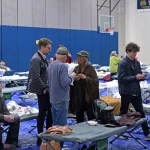The UN health agency said the B.1.617 variant of COVID-19 first found in India last October might also have some increased resistance to vaccine protections.“There is some available information to suggest increased transmissibility of the B.1.617,” Maria Van Kerkhove, the WHO’s lead on COVID-19, told reporters.She also pointed to early studies “suggesting that there is some reduced neutralisation”, a reference to the possibility that vaccines might be less effective against it.“As such, we are classifying this as a variant of concern at the global level,” she said.More details would be provided in the WHO’s weekly epidemiological update on Tuesday, she added.India, suffering from one of the worst outbreaks in the world, reported nearly 370,000 fresh infections and more than 3700 new deaths on Monday.The devastating wave has overwhelmed India’s healthcare system, and experts have said the official figures for cases and fatalities are much lower than the actual numbers.It has for some time been feared that B.1.617 – which counts several sub-lineages with slightly different mutations and characteristics – might be contributing to the alarming spread.But until now, WHO has listed it merely as a “variant of interest”.BLOW TO INDIA TRAVEL BAN CHALLENGEThe legal challenge to the government’s controversial India travel ban has suffered a blow as a judge threw out arguments accusing Health Minister Greg Hunt of incorrectly wielding his emergency powers. But there may be a constitutional argument to come ahead of the ban being lifted on Friday.The emergency determination making it unlawful for citizens and non-citizens alike to enter Australia if they had been to India in the 14 days prior came into force last Monday.It is being challenged in the Federal Court by Melbourne man Gary Newman, who flew to India in March 2020 to visit friends and is now stranded there as the South Asian nation bends under the weight of a deadly COVID outbreak.The dual Australian and UK citizen is in Bangalore and, at age 73, is in a “vulnerable demographic”, his lawyer Christopher Ward SC told the court on Monday.He initially intended to stay the term of his 180-day visa but his plans were stymied by the pandemic. A return flight he booked in November 2020 was cancelled, the court heard, and he wants to come home “as soon as possible”.An affidavit filed by his solicitor Michael Bradley on May 5 states: “(He) has not left his residence in the past 12 days as he is fearful of contracting COVID-19 and suffering severe illness.”The first two of Mr Newman’s four arguments against the ban, alleging Mr Hunt had improperly used his powers under the Biosecurity Act, were thrown out by Justice Thomas Thawley on Monday. Dr Ward told the court the ban was the “most intrusive and restrictive method” of controlling COVID-19 possible. He argued Mr Hunt had failed to consider if the ban on direct flights from India, enacted just days earlier, could have worked as a much less restrictive means of achieving the same outcome.He said the minister must have had evidence of a “real and serious risk” to Australia’s quarantine system presented by people transiting through third states from India to Australia in order for “a decision of this magnitude, this sensitivity, this extraordinary infringement on a fundamental right to be valid”.“Of which there is not a skerrick of evidence. Not a jot,” Dr Ward said.But the argument was rejected by Justice Thomas Thawley, who found Mr Hunt had considered if the next step of banning all travellers was necessary as the minister had read a letter from chief medical officer Paul Kelly dated April 30 that referenced the flight ban.“It is tolerably clear that the chief medical officer thought further relief would come to Australia’s quarantine endeavour by preventing further entry, even for those travelling indirectly through transit hubs,” the judge said.Dr Ward also said Mr Hunt had failed to consider the potential knock-on effect of COVID-19 spreading in prisons if flouters of the ban were jailed.But Justice Thawley described the hypothetical as a “strange situation” and ruled Mr Hunt did not have to consider it.Dr Ward also argued the Biosecurity Act did not, in clear terms, grant Mr Hunt the power to override the fundamental right of citizens to return home.“In our submission, section 477.1 grants the minister undoubtedly broad, sweeping powers to respond to biosecurity emergencies,” he said.“But it does not grant the minister broad sweeping powers to abrogate fundamental common law rights.”Craig Lenehan SC contended it did, saying a “bulldozer” effect gave the Commonwealth broad powers.Here, too, Justice Thawley found in favour of the Commonwealth, saying the power was deliberately drafted broadly.The case may now proceed to hearing Mr Newman’s third and fourth arguments, which contend respectively that the travel ban was a disproportionate response in the circumstances and that it was unconstitutional.But, as Dr Ward acknowledged, there was a possibility it all became moot on Friday afternoon if the government repealed the ban.INDIAN VARIANT ‘WORLD’S PROBLEM’A COVID-19 variant spreading in India is more contagious and it is feared it could be dodging some vaccine protections, contributing to the country’s explosive outbreak, the World Health Organisation’s chief scientist has said.In an interview with AFP, Soumya Swaminathan warned that “the epidemiological features that we see in India today do indicate that it’s an extremely rapidly spreading variant”.India on Saturday for the first time registered more than 4000 COVID-19 deaths in just 24 hours, and more than 400,000 new infections.New Delhi has struggled to contain the outbreak, which has overwhelmed its healthcare system, and many experts suspect the official death and case numbers are a gross underestimate.Dr Swaminathan, an Indian paediatrician and clinical scientist, said the B. 1.617 variant of COVID-19, which was first detected in India last October, was a contributing factor to the catastrophe unfolding in her homeland.“There have been many accelerators that are fed into this,” the 62-year-old said, stressing that “a more rapidly spreading virus is one of them”.The Indian variant B. 1.617 is considered a variant of concern by the US and Britain, and Dr Swaminathan said she expected the WHO to soon follow suit.“B 1.617 is likely to be a variant of concern because it has some mutations which increase transmission, and which also potentially could make (it) resistant to antibodies that are generated by vaccination or by natural infection,” she said.While India is now trying to scale up vaccination to rein in the outbreak, Dr Swaminathan warned that the jabs alone would not be enough to gain control of the situation.“It’s going to take many months if not years to get to the point of 70 to 80 per cent coverage,” she said.The surge in India is frightening not only due to the horrifying number of people who are sick and dying there, but also because the exploding infection numbers dramatically increase the chances of new and more dangerous variants emerging.“The more the virus is replicating and spreading and transmitting, the more chances are that … mutations will develop and adapt,” Dr Swaminathan said.“Variants which accumulate a lot of mutations may ultimately become resistant to the current vaccines that we have,” she warned.“That’s going to be a problem for the whole world.”POTENTIAL FATAL FUNGAL INFECTION APPEARS IN PATIENTSFatal fungal infections that can kill are appearing in people who have had COVID-19 or have recently recovered in India.The condition, caused by a mould that grows in wet environments, has affected at least 200 patients recovering from COVID-19 in the state of Maharashtra, local media report. Reports add that eight of those died.There are also reports of inactions in India’s capital, Delhi.“We have heard that in some areas, people who are COVID-infected or recovered suffer from mucormycosis, but there is not a big outbreak of it,” Dr. V.K. Paul, who heads India’s COVID task force, said last week. “We are watching and monitoring.”OLYMPIC ATHLETES DIE OF COVID-19Two members of India’s last Olympic gold-medal-winning hockey team have died from COVID-19 on the same day.Ravindra Pal Singh, 60 and Maharaj Krishan Kaushik, 66, who competed in the 1980 Moscow Olympics died just hours apart on Saturday, their families said.Both had been on ventilators in hospitals.Mr Kaushik went on to coach the India men’s side to gold at the 1998 Asian Games in Bangkok. He also coached the women’s side that took bronze at the 2006 Asian Games in Doha.Mr Singh also played for India at the 1984 Olympics in Los Angeles, but retired because of chronic back injuries.“His contribution to Indian sports will always be remembered,” India’s Sports Minister, Kiren Rijuju, said in a tribute.It came as India’s COVID-19 deaths rose by more than 4,000 for the second straight day on Sunday.The country’s health ministry reported 4092 fatalities, only marginally fewer than Saturday’s tragic record toll when 4187 deaths recorded.India on Sunday also added another 403,738 new COVID-19 infections, with its total caseload since the start of the pandemic ballooning to 22.3 million.Hotel Quarantine
Powered by WPeMatico






